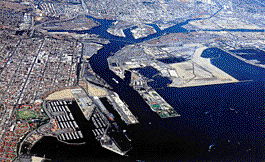
Los Angeles Harbor, officially known as WORLDPORT LA is the busiest cargo
terminal in the United States and a leader in international trade, with
facilities and staff unmatched by any U.S. port. Cargo and passenger vessels
flying flags of many of the world's nations call here daily, adding to the
ever-changing tableau of port activity. Visit the World Cruise Center at
WORLDPORT LA, Berth 93, the busiest passenger port of call on the West
Coast.
Annual Container Volume:
4.4 million TEUs (twenty-foot equivalent units), fiscal year 2000
3.5 million TEUs, fiscal year 1999
Cargo Tonnage:
101.5 million metric revenue tons, fiscal year 2000
82.1 million metric revenue tons, fiscal year 1999
Cargo Value:
$83.1 billion, calendar year 1999
$79.3 billion, calendar year 1998
Ranking by Container Volume:
2nd busiest port in the United States;
8th busiest in the world
259,000 jobs in Southern California, one out of every 24 jobs
Wages: $8.4 billion in Southern California; $1 out of every $23
$200 million in infrastructure improvements have been completed
by the Port of Los Angeles, helping to ensure a seamless flow of goods
movement in the transportation chain.
The Alameda Transportation Corridor:
As the largest infrastructure project in the nation, the Alameda Corridor
transportation project will speed the flow of cargo and reduce traffic
congestion. It is scheduled for completion in 2002.
The Alameda Corridor will consolidate 90 miles (145 kilometers) of railroad
track age into a single, 20 mile (32 kilometer) rail and highway corridor
connecting the Port of Los Angeles and Long Beach to downtown Los Angeles
railheads and ultimately to the intercontinental rail network. When completed
in 2001, the corridor will handle up to 100 trains daily at speeds up to 40
mph (64 kph). The value of trade generated indirectly by the Corridor is
projected at $253 billion by the year 2010 or 126.5 times its construction
cost.
Pier 300/400 Implementation Program:
The major components of the Program include dredging three-miles (5
kilometers) of wide navigation channels, as well as development and
construction of cargo facilities on Piers 300 and 400. Specifically, the
Program will comprise:
10 new terminal buildings with 350 acres (142 hectares) of redeveloped land
for container and dry bulk cargo storage.
5,000 lineal feet (1,524 meters) of new, deep-water berths for post panamax
containerships and large dry bulk carriers.
Five new highway/rail grade
separations.
35 miles (56 kilometers) of new railroad
track.
A replacement for the Badger Avenue Bridge over the Cerritos
Channel.
Batiquitos Lagoon Enhancement Project in San Diego
County.
The largest dredging and land reclamation project in United States history.
|